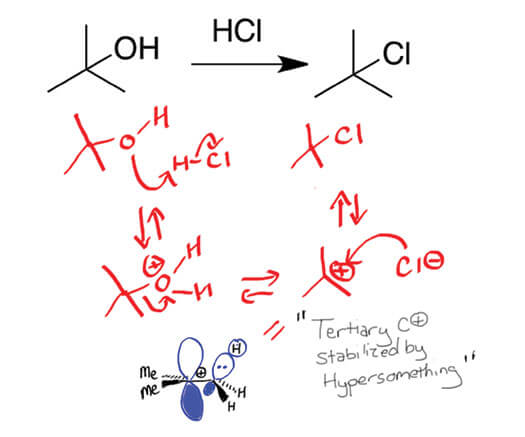Complicated Compounds

A student’s answer on an organic chemistry worksheet: this is a depiction of a reaction mechanism (an SN1 reaction, for those in the know) with curved arrows showing how electrons “move” and change from one compound to another. Not every notation (e.g., “Hypersomething”) is correct.
The cruelest course on campus may not live up to its legend.
Harder than teaching a dog how to “Bucky,” more terrifying than losing Paul Bunyan’s axe, able to crush dreams in a single semester. The most infamous class on campus is now … not that bad?
For decades, generations of Badgers have lived in fear of one class in particular: organic chemistry (or “Evil O. Chem,” as it is not-so-fondly called).
Attending a fifty-minute lecture three days a week, UW students in introductory organic chemistry (Chemistry 341 and 343) learn the basics about carbon compounds. A pre-requisite for many majoring in a science or medical field, this course also coordinates with a lab and weekly discussion sections.
After hearing nothing positive about organic chemistry from fellow students, Alex Kelsey x’14, a psychology major at UW–Madison, believed the course’s infamous reputation. “I was absolutely terrified to enroll in organic chemistry,” he says. “I actually considered changing career plans to avoid taking the class.”
But some things aren’t as bad as rumored. Perhaps the hellish reputation this course has is outdated — rooted in ways of teaching that are now obsolete.
“Students have been afraid of organic chemistry for forever,” explains lecturer Matt Bowman. “Maybe it’s because of the way it used to be taught, where it was memorize this, memorize that; it’s not taught that way anymore.”
Bowman attributes this change in part to the addition of discussion sections led by teaching assistants (TAs). In the past, students had only one option for getting help outside of the regular lectures: attending professors’ office hours. The discussion sections allow students to meet with a TA and ask questions, review problems, or get tips on how to solve equations.
The online tool Learn@UW is another resource today’s students can use to understand organic chemistry. “I can post my TAs’ notes from my lecture and my own notes so students can see different examples,” explains Bowman.
“The truth is that, yes, it’s a difficult class, and some people are more adept at understanding the concepts than others. But there are plenty of resources available to help students,” says Alexandra Douglas x’13.
Bowman realizes that most students come to an organic chemistry class believing it is going to be awful, thanks to all the negative hype that surrounds it. And, despite added resources to help students succeed, most chemistry classes maintain a retention rate of only 80 percent — a fact that he attributes to the class’s bad rap.
“[Students] come in expecting to have a bad time,” explains Bowman. “And because of that, some of them are not surprised — they have a bad time.”
Perhaps the secret to success in organic chemistry is to not believe its reputation. “The class did not live up to the hype, and it is actually my favorite class to date,” says Kelsey. “My opinions of organic chemistry now are drastically different from what they were before I took the class.”
Published in the Spring 2013 issue



Comments
No comments posted yet.